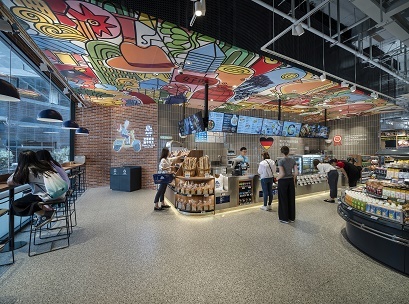
From exclusive brands handpicked for the Shanghai market and an on-site food station to a smaller store format specifically catering to Chinese consumer habits, Aldi China launched its two pilot stores in Shanghai on June 7, designed by Australian agency Landini Associates.
The two stores, located in the Jing’an and Minhang districts, allow the German grocery retailer to test and trial retail strategies for the local community, then adjust them according to data and feedback from customers. The stores are Aldi’s first in Asia.
According to a statement from the grocery retail giant, “This new store format has been customised and tailored specifically for the China market to better understand and interact with Chinese consumers.”
Ben Goss, a design director at Landini, said, “We gained interesting insights on how Chinese customers value quality and provenance. It’s very important for them to know how and where their products are made. Also there a sense of immediacy and convenience. Instant delivery services are standard in Shanghai and mobile payment apps like WeChat or Alipay are widely used.”
Aldi first launched in China in April 2017 through cross-border e-commerce store Tmall.
The interior
Around the store are 40 different message boards featuring graphic illustrations designed for the Chinese market communicating Aldi’s brand ethos, product freshness, value, quality and European and Australian award-winning products. A vibrant, colourful mural hangs on the ceiling above the service counter and checkouts for a playful touch.
Fresh and ready to go
Some of the key differences between Aldi in Australia (which Landini also designed) are in the scale, layout and tone of the Chinese stores. In Shanghai, where customers prefer to visit multiple small shops a week, the stores are smaller and the emphasis is on fresh produce and readymade meals, such as Sichuan-style spicy crayfish salad and the Berliner Bao – German sausage with sauerkraut in a traditional Chinese steam bun.
“The stores in China are positioned as pilot stores, and are smaller than the stores in Australia. In addition to this, we have a Food Station offering dine-in or takeaway dishes including German sausages, steam buns, dim sum and more. All products are curated to the Chinese market and local tastes,” said Wayne Cheng, a design director at Landini.
Offline to online – and vice versa
Both pilot stores feature a scan-and-go function on WeChat that lets customers skip the queue, while a new WeChat mini-program offers its products online with instant delivery service within three kilometres around each store.





